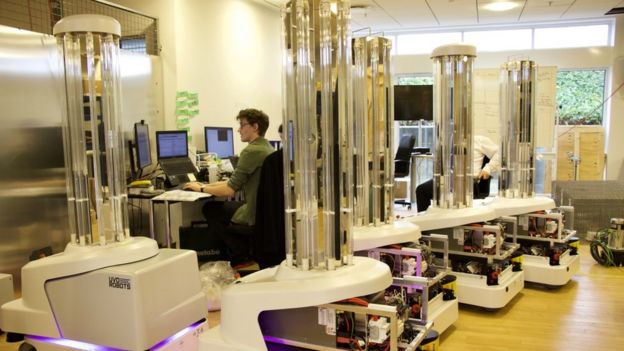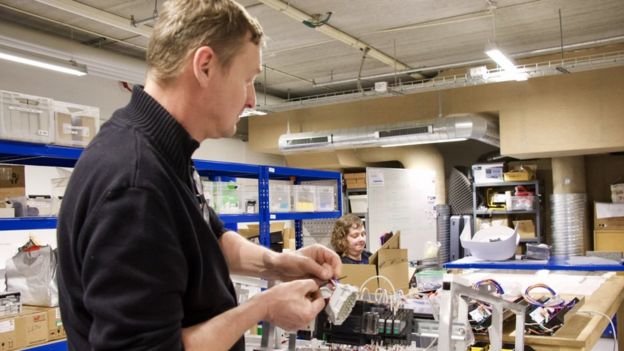“Please leave the room, close the door and start a disinfection,” says a voice coming out of the robot.
“It says it in Chinese as well now,” Simon Ellison, vice president of UVD Robots, tells me as he demonstrates the machine.
Through a glass window we watch as the self-driving machine navigates a mock-hospital room, where it kills microbes with a zap of ultraviolet light.
“We had been growing the business at quite a high pace – but the coronavirus has kind of rocketed the demand,” says chief executive, Per Juul Nielsen.
He says “truckloads” of robots have been shipped to China, in particular Wuhan. Sales elsewhere in Asia, and Europe are also up.
“Italy has been showing a very strong demand,” adds Mr Nielsen. “They really are in a desperate situation. Of course, we want to help them.”

Production has been accelerated and it now takes less than a day to make one robot at their facility in Odense, Denmark’s third largest city and home to a growing robotics hub.
Glowing like light sabres, eight bulbs emit concentrated UV-C ultraviolet light. This destroys bacteria, viruses and other harmful microbes by damaging their DNA and RNA, so they can’t multiply.
It’s also hazardous to humans, so we wait outside. The job is done in 10-20 minutes. Afterwards there’s a smell, much like burned hair.
“There are a lot of problematic organisms that give rise to infections,” explains Prof Hans Jørn Kolmos, a professor of clinical microbiology, at the University of Southern Denmark, which helped develop the robot.
“If you apply a proper dose of ultraviolet light in a proper period of time, then you can be pretty sure that you get rid of your organism.”
He adds: “This type of disinfection can also be applied to epidemic situations, like the one we experience right now, with coronavirus disease.”

The robot was launched in early 2019, following six years of collaboration between parent firm, Blue Ocean Robotics and Odense University Hospital where Prof Kolmos has overseen infection control.
Costing $67,000 (£53,370) each, the robot was designed to reduce the likelihood of hospital-acquired infections (HAIs) which can be costly to treat and cause loss of life.
While there’s been no specific testing to prove the robot’s effectiveness against coronavirus, Mr Nielsen is confident it works.
“Coronavirus is very similar to other viruses like Mers and Sars. And we know that they are being killed by UV-C light,” he says.
CLICK HERE FOR FULL ARTICLE ON THE BBC


